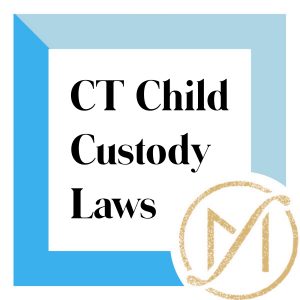Connecticut Child Custody Laws

There’s a lot of legal terminology involved when making custody, visitation, & parenting decisions in your divorce or following a breakup with your partner. So it’s no wonder that a common question our child custody attorneys are asked is: “What are the Connecticut child custody laws?”
Read on to learn more.
Connecticut Child Custody Versus Visitation
The terms “custody” and “visitation” are sometimes used interchangeably in family law, but they have different meanings. Custody is a broader term and can refer to either legal or physical custody, while visitation relates to time spent with the child.
Read: What Does Child Custody Mean?
CT Child Custody Laws
General Statutes § 45a-606 sets out parents’ general custody rights. Generally speaking:
- a child’s parents are joint guardians of the child
- the parents’ powers, rights, and duties are equal
- If either parent dies or is removed as guardian, the other parent becomes the child’s sole guardian.
Legal Custody vs. Physical Custody
There are two types of custody: legal custody and physical custody.
- Legal custody: refers to a parent’s right to make important decisions about a child’s upbringing, such as the medical care they receive, where they go to school, and what religious faith they are brought up in.
- Physical custody: a child’s living situation — where and when the child lives.
Read: What’s the Difference Between Shared Custody and Split Custody?
Joint Custody vs. Sole Custody
There are two types of joint custody: joint legal custody and joint physical custody.
- Joint Custody: what it’s called when a court orders custody of a minor child to both parents. Generally speaking, when someone refers to “joint custody” and doesn’t specify whether it’s legal or physical, it means that both are joint.
- Sole custody: when one parent alone has custody. As with joint, you can have sole legal custody, sole physical custody, or both. Just because a parent has sole physical custody doesn’t mean that the other parent doesn’t have visitation rights. Even if your ex has sole physical custody of your child, you still have parental rights. For example, child support obligations and visitation rights often exist, even when the other parent has sole custody. In other words, not having custody of a child is not the same as having your parental rights terminated.
Read: Do I Have to Pay Child Support if We Have Joint Custody?
Read: Joint Custody vs. Sole Custody
Changing Child Custody
When the court finalized your divorce or initial custody matter, the Judge issued a final, enforceable court order. Down the road, post judgment, you may want to try to adjust or change your custody plan. But sometimes, part of that order doesn’t work for you and your family, and there are child custody issues.
Read: What are the Most Common Post Judgment Motions After a Connecticut Divorce?
Read: What is a Motion for Modification?
Next Steps
If you have questions or want to learn more about how our team of divorce attorneys can help you with your divorce or post judgment issue, please contact us either here or by phone.








